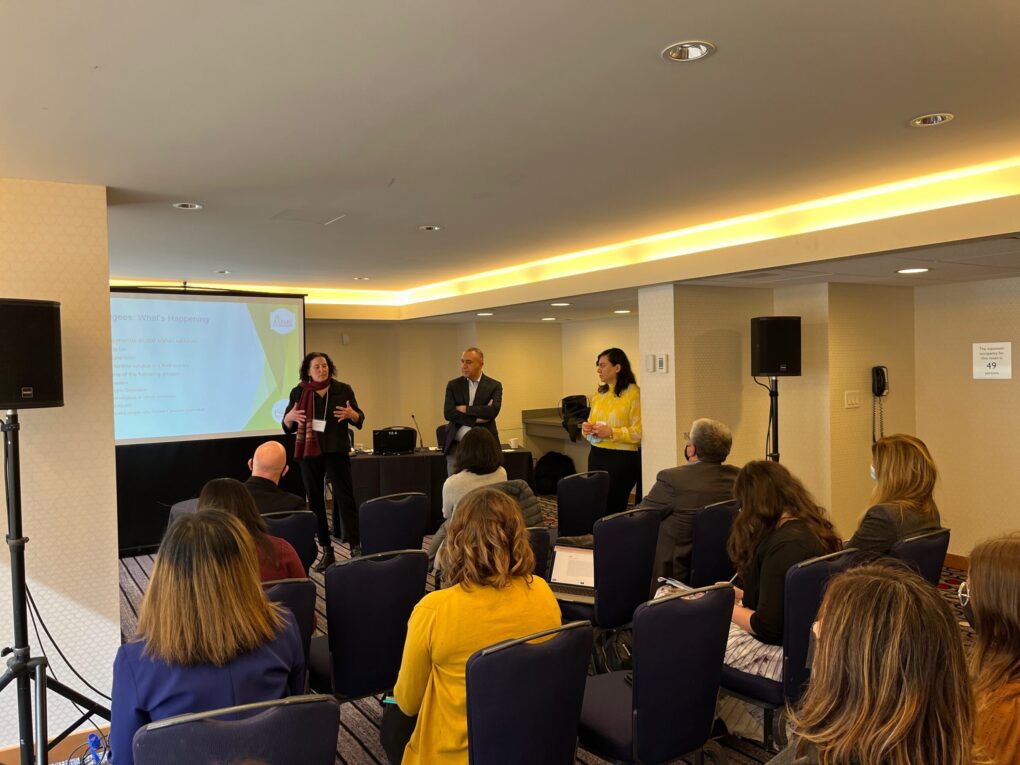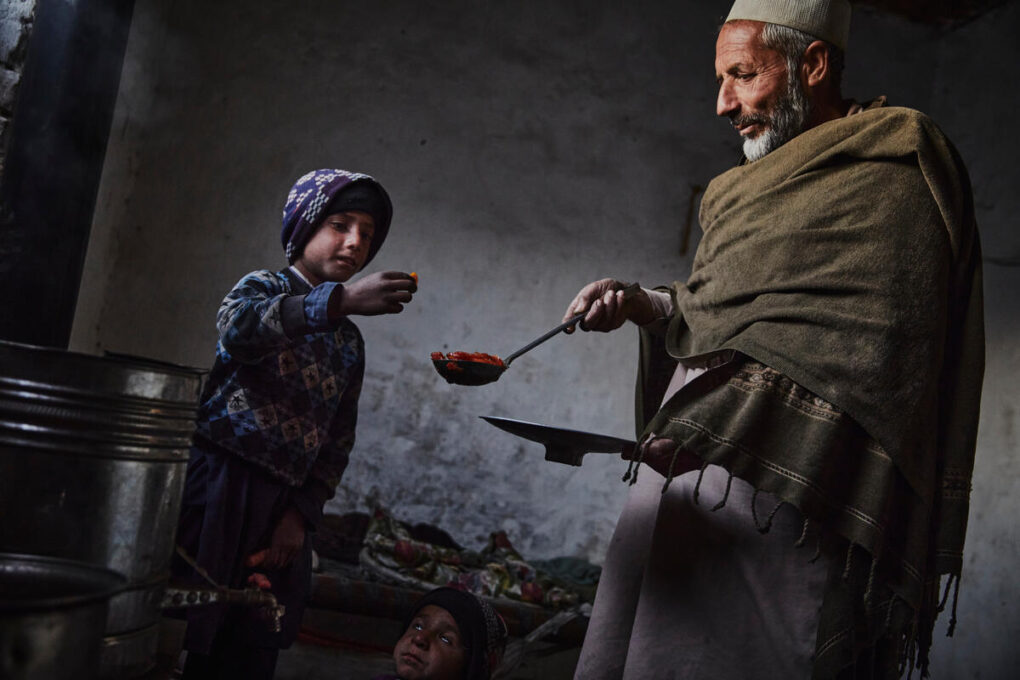While Canada has opened one dedicated stream for all Ukrainians escaping Russia’s invasion, it only made room for 40,000 Afghans escaping the Taliban’s rule under four cumbersome emergency response streams.
And according to human rights advocate Corey Levine, “this 40,000 includes Afghans who were already in the pipeline as immigrants or refugees that haven’t yet made it to Canada.”
“I welcome what the government has done for Ukrainians,” Levine said during the first day of the 24th Metropolis Canada Conference in Vancouver, British Columbia. “I am only asking that there should be a level playing field.”
Levine is the humanitarian affairs director of Aman Lara, a non-profit organization that helps evacuate people at risk from nations in crises with the support of government agencies. According to her, while they have been able to help 2,000 Afghans flee that country since the Taliban took over in August of last year, 10,000 more still remain in their database.
“We are prioritizing those who already have approval to Canada and all their documentation, including their passports,” she said.
But given the swiftness with which Canada has helped resettle Ukrainians and its willingness and ability to facilitate the immigration process, Levine notes how relatively little has been done to help Afghans the same way.
Qualifying Afghans
“Canada’s program to help Ukrainians was announced pretty quickly, right around the time when Russia invaded Ukraine,” Levine said, referring to the single immigration program facilitating Ukrainians’ entrance to Canada.
By contrast, there are four pathways “for a select number of Afghans, depending on which pathway you fall under,” she added, including a special immigration program for Afghan nationals and their families who assisted the Government of Canada.
Levine says most of the people they have managed to get out of Afghanistan have fallen under this category, which she believes provides the best chances of evacuation because “they don’t need to be out of Afghanistan to apply to come to Canada.”
A recent Immigration, Refugees and Citizenship Canada (IRCC) report confirms the government has received 14,875 applications under this stream, 10,180 of which have been approved. Of those, only 5,235 Afghans have actually arrived in Canada. The rest remain in a third country or in Afghanistan.
Canada’s response also includes a special immigration program for Afghan nationals, and their families, who assisted the Government of Canada. To qualify for this program, they don’t need to currently be in Afghanistan or to return there if they’re already in a third country.

A separate humanitarian program was also set up to support women leaders, human rights defenders, members of the LGBTQI community, persecuted ethnic or religious minorities, journalists and those who have assisted Canadian journalists.
But in order to qualify under that stream, Afghan nationals must be outside of Afghanistan and have no durable solution in a third country, as defined by the United Nations High Commissioner for Refugees (UNHCR). This means there are no other solutions to “end the cycle of displacement and allow refugees to lead normal lives” other than resettlement in Canada.
But that has proven difficult as well, because, as Levine says, “neighbouring countries around Afghanistan (like Iran and Pakistan) have effectively closed their borders to Afghans, making it very difficult to get out.”
Welcoming Ukrainians
On the other hand, Canada’s response to help Ukrainian nationals provides them with temporary visas.
Under this special program, once here, Ukrainian citizens and family members with valid statuses as visitors or with study or work permits will be able to extend their stay for up to three years, with the processing fees waived.
All Ukrainians can apply for this program from Ukraine, unlike Afghans who can only apply for a corresponding stream while they are outside of Afghanistan, hoping to qualify as refugees by UNHCR’s standards first.
“It forces Afghans to become refugees in order to be eligible to come to Canada,” Levine said.
Niousha Masoumi, the executive director of the U.S.-based Phoenix Refugee Support Consultancy, has spent eight months in Afghanistan assisting Afghans fleeing Kabul. As she sees it, the pathways provided to Afghan nationals do not seem to be immediate solutions to an emergency, but rather drawn-out, technical responses that require meeting stringent criteria, as if it weren’t an emergency but a process.
“With Ukraine, the government has publicly stated that they can get Ukrainians here within two weeks, which is phenomenal,” Masoumi said. “But being designated as a refugee by UNHCR takes much longer.”
“It’s doubly challenging if you are someone who is a target for the Taliban,” Levine added.
Emergency vs. process
Refugee Status Determination (RSD) is the “legal or administrative process by which governments or UNHCR determine whether a person seeking international protection is considered a refugee under international, regional or national law,” according to the UNHCR. According to its Procedural Standards, “it is recommended that RSD decisions generally be issued within three months following the RSD Interview.”
And according to the IRCC, “it can take up to four months for a refugee to arrive in Canada after their sponsorship has been approved.”
However, as NCM has previously reported, people have waited longer than five years with no answer, while others complain about the inconsistencies between agencies including the UNHCR and IRCC.
Levine says the only other option for Afghans to avoid becoming refugees to immigrate to Canada is to apply for permanent residency. But that is a much longer process, she adds, and “it’s not really suitable to address an emergency situation such as Afghanistan.”
It also means that Afghan nationals wanting to immigrate by applying for permanent residence would only be eligible for programs once they arrive in Canada, “unlike the pathway for Ukrainians where they are eligible for programs before they need to step outside of Ukraine and before entering Canada,” she said.
In a recent report, Canada’s border agency says 3,368 Ukrainians have arrived in Canada since the start of the war on Feb. 24. Meanwhile, according to the IRCC, 9,560 Afghan nationals have arrived in Canada, under all streams, since August of last year out of the total 40,000 the government aims to bring over the next two years.
With a background in journalism and migration studies, Zahra Mahdi worked as a freelance correspondent covering immigration and refugee policies from May 2021 to April 2022. Her bylines also appeared in the Toronto Star. She is a Master’s student in Migration and Diaspora Studies at Carleton University and holds an undergraduate degree in journalism.





